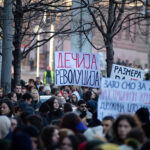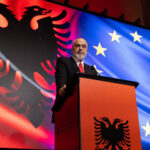- Mass shooting in Montenegro on New Year’s Day
On New Year’s Day 2025, 45-year-old local resident Aco Martinović killed 12 people, including two boys aged 9 and 14, in the Montenegrin town of Cetinje. Most of the victims were his relatives or friends.
Before the murder, Martinović had been drinking in a bar, then took a weapon at home, which, according to available information, he obtained illegally, and started shooting. When police officers found the attacker, it turned out that he attempted suicide and shot himself in the head. Martinović died a few hours later.
Following the mass murder in Cetinje, the National Security Council of Montenegro held an extraordinary meeting. A number of recommendations were adopted to improve gun control and ensure the safety of citizens.
In particular, a number of amendments are planned to include to the Weapon Act, including raising the age limit for obtaining weapons, shortening the validity period of weapons licenses, and increasing penalties for illegal possession and carrying of weapons. Security and psychological diagnostics of legal weapon owners will be carried out by the end of this year.
The number of police personnel is expected to increase.
However, society believe this is not enough.
On Sunday, January 5, thousands of people gathered in Podgorica and Cetinje, demanding the resignation of officials after the mass shooting.
Both gatherings, organized by the informal student organization Kamo Śjutra? (Where Tomorrow), began with 12 minutes of silence at the vigil in memory of those killed in Cetinje on the first day of 2025.
Protest leaders have called for the immediate resignation of the Interior Minister, Danilo Šaranović and Deputy Prime Minister for Security and Defense, Aleksa Bećić. This demand is also supported by the mayor of Cetinje, Nikola Đurašković, who is a representative of the opposition Social Democratic Party of Montenegro (SDP).
The authorities have called the protests and demands for the resignation of government members a campaign by opposition forces. However, Kamo Śjutra? denies these accusations.
Montenegro is among the world leaders in terms of the number of weapons owned by citizens. According to open sources, almost 11 % of citizens in Montenegro have legal weapons – 68 thousand out of 633 thousand people – who own more than 100 thousand weapons. In addition, it is estimated that citizens have at least 40 thousand or even more than 100 thousand unregistered weapons.
- Belgrade is ready to buy Russian stake in the Petrolium Industry of Serbia (NIS)
This was announced by Serbian President Aleksandar Vučić. According to him, the Serbian authorities are ready to buy the Russian stake in the Petrolium Industry of Serbia (Naftna industrija Srbije, NIS) due to the threat of US sanctions against this company. According to the Serbian President, the restrictions will be announced by the USA on 10, 13 of January 2025.
On January 5, in an interview with the Serbian RTS TV, Vučić emphasized that the purchase of NIS shares from the Russian Gazprom and Gazprom Neft companies is a last chance to avoid possible restrictions. Before a final decision on this matter to be made, Vučić intends to hold talks with the Russian side, primarily with Russian President Vladimir Putin.
NIS is Serbia’s leading energy company and a regional leader in the industry. The company owns the Pančevo Oil Refinery, oil and gas fields, and over 400 gas stations. Russian Gazprom Neft and Gazprom energy companies are majority-owners of NIS (50 % and 6.15 % of the shares, respectively). The Serbian government owns 29.87 % of the company.
“We have the money to buy it (the stake) right away. If the estimated value of the company is one billion euros, then we are talking about 600 million or something like that. Whether it will be 500, 600 or 700 million, it is not very important,” Vučić said.
According to regional media, it is unclear what exactly Vučić’s calculations were based on. According to the list of the 100 largest companies in Serbia for 2023, made by the Serbian government, the estimated value of NIS assets alone is about 4.4 billion euros.
- Croatia wants to create a Croatian Orthodox Church
Representatives of the Homeland Movement (Domovinski pokret), which is part of the ruling coalition in Croatia together with the HDZ (Hrvatska demokratska zajednica), confirmed their intention to create a Croatian Orthodox Church. This was announced on January 6 during a reception in honor of Orthodox Christmas, which was organized by the Croatian Orthodox Center.
“The main goal of our association is the creation of a Croatian Orthodox Church. Last year … we said that we plan to achieve this goal within five years. We are satisfied with how the process of achieving this goal has been going on over the past year, so today we are convinced that we will be able to achieve the goal even earlier than planned, the representative of the Homeland Movement, Predrag Mišić (an ethnic Serb) said in his speech at the reception.
The reception of the Croatian Orthodox Center was attended by members of parliament, the Minister of Demographics and Immigration, Ivan Šipić and other representatives of the Homeland Movement.
Andrej Plenković, the Prime Minister and HDZ leader, attended the Christmas reception, which was organized on January 6 by the Serbian National Council of Croatia with the participation of the Serbian Orthodox Church. When journalists asked Plenković about his thoughts regarding the creation of the Croatian Orthodox Church, he replied that he knew nothing about it.
The head of the Serb National Council (SNV) and a MP from the Serbian national minority, Milorad Pupovac, expressed his dissatisfaction with the idea of the Homeland Movement. “The Croatian Orthodox Church has a terrible tragedy from the time of World War II… It cannot be accepted,” Pupovac said after the SNV Christmas reception, answering questions from journalists.
The idea of creating a Croatian Orthodox Church was widely criticized by Serbian media, citing the events of World War II.
Thus, the development of this topic could contribute to both domestic tensions in Croatia and aggravation of relations between Zagreb and Belgrade, given the close connection between the Serbian state leadership and the Serbian Orthodox Church.



